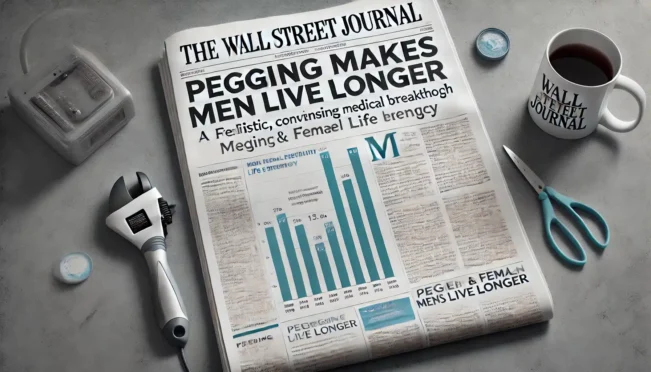We all know that leading a healthy lifestyle, eating well, exercising, and maintaining strong social connections can help us live longer, but what if there’s another factor we’ve been overlooking? A surprising new scientific study reveals that pegging makes men live longer. That's right, men who try pegging with their partner are proven to live up to 22% longer than men who do not. Could this intimate activity really be the key to longevity? Today we will delve into what the research suggests about living longer by adding weekly pegging to your relationship. Additionally we will give credit to the scientific community’s growing interest in the positive effects of sexual exploration.
This scientifically reviewed study provides irrefutable proof that couples who engage in pegging on at least a weekly basis are not only happier, healthier, and more emotionally connected but the prostate stimulation of pegging is proven to be the magic elixir of longevity. Who would have predicted that pegging, the activity where a woman uses a strap-on dildo to penetrate a man would have a scientifically proven impact on longevity?
We know that men who are willing to explore new sexual experiences are often in healthier relationships, are linked to better mental health, less stress, and improved emotional well-being. These factors, of course, play a significant role in the overall quality of life and, quite frankly, could be seen as an indirect contributor to a longer life expectancy. This newly discovered finding about regular prostate stimulation may encourage couples to communicate more openly about their desires, and we see a connection between sexual exploration and male longevity.
Additionally, the very act of introducing something new and exciting into a relationship can give people a sense of adventure, keep their brains active, and reduce feelings of boredom or complacency—things that might negatively impact mental health. But, you might ask, what is the specific scientific data backing up these longevity claims?
The truth is, this is a April fools joke and there is absolutely no definitive scientific study (yet!) that proves pegging has any impact on life expectancy, much less 22%. There is, however plenty of research that connects various forms of sexual expression with a longer, healthier life. While I'm sure you are saddened to hear that the headline of this blog isn't true, let’s take a look at some credible facts that suggest why sexual health and intimacy could have a positive impact:
- Stress Reduction and Mental Health Benefits: Studies have shown that regular sexual activity can help reduce stress levels and improve mood. Engaging in activities that make us feel fulfilled and happy can lower cortisol levels and increase the release of endorphins—our body’s natural "feel-good" chemicals. A decrease in chronic stress and an increase in happiness can, theoretically, contribute to a longer life by mitigating the harmful effects of stress-related illnesses.
- Improved Relationship Quality: Couples who are willing to experiment in the bedroom tend to have higher levels of communication and trust. Strong, supportive relationships have been linked to lower rates of heart disease, depression, and anxiety, which directly impact life expectancy. When partners can openly express their needs and desires, they often experience better emotional connection and overall relationship satisfaction, leading to fewer stressors and healthier lifestyles.
- Increased Physical Activity: While pegging may not be the most physically strenuous activity, it does engage multiple muscle groups, particularly those in the core and pelvic areas. Any form of physical activity, no matter how mild, can have positive effects on cardiovascular health and muscle tone, which are key contributors to longevity. Additionally, frequent physical activity has been associated with lower rates of obesity, diabetes, and other chronic conditions that shorten life expectancy. Engage that core, ladies and lets get pegging.
- Exploring New Experiences: One of the key factors in maintaining good mental health as we age is keeping our minds active and open to new experiences. Whether it's trying a new hobby, traveling, or even experimenting with different forms of intimacy, the act of stepping out of your comfort zone can keep your brain engaged. People who embrace new experiences tend to report higher levels of happiness, resilience, and cognitive function, all of which contribute to a higher quality of life.
- The Role of the Prostate: For men, prostate health is an important consideration when it comes to longevity. Engaging in activities like pegging may help stimulate the prostate, which can lead to better prostate health and potentially reduce the risk of prostate-related issues. Some studies have suggested that regular prostate stimulation could help prevent prostate cancer, though more research is needed in this area. So, could pegging be an indirect contributor to better prostate health? Maybe. There is scientific proof that men who receive anal sex (real link this time) are at no greater risk of developing prostate cancer.
- Pain Management and Endorphin Release: Sexual activities, especially those involving deeper penetration or anal play, can lead to the release of endorphins, which act as natural painkillers and mood boosters. For individuals dealing with chronic pain conditions, including those related to stress or aging, endorphins can help reduce pain and promote relaxation.
…
